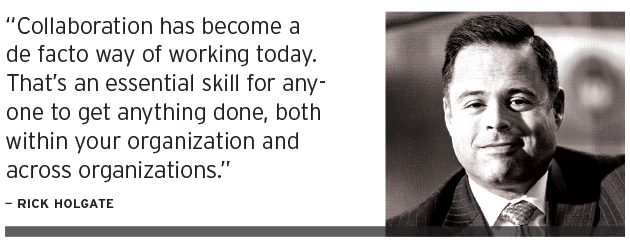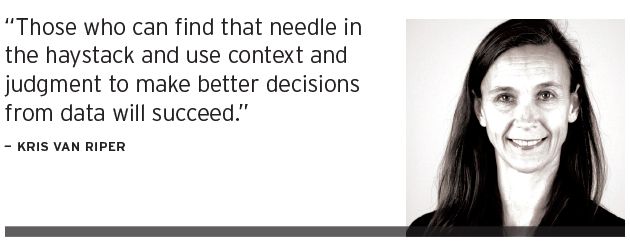How to get ahead in government
Technical chops and hard work are still critical, but advancing into agency leadership demands a much broader skill set.

For the rising government IT professional, there's no longer a clear career path -- if there ever really was one. Compared with the leaders currently in those positions, future CIOs will need a new set of skills, a diversity of experiences and fresh perspectives.
"One big pitfall is for people to think…that in order to get to the CIO job, I'm going to need to do what my CIO did," Kris van Riper, managing director of CEB's government practice, told FCW. "All our research indicates that what made them successful up until this point will probably be a different skill set than what makes their successor successful."
Two important trends bear on the question. First, the balance of individual and team contributions to a project's outcome has shifted in the past 10 years. A decade ago, the individual's effort contributed 80 percent, and the work of the team accounted for 20 percent. Now, the two components are balanced 50-50, van Riper said.
Second, IT departments are increasingly serving as consultants to business units and helping them solve their technical problems, rather than simply taking orders for systems and delivering them some months later. For every $1 that a CIO spends on IT, business unit partners spend another 40 cents on average, van Riper said, which means a huge chunk of the IT budget lies outside the CIO's control.
The IT department "is moving to be more of a broker and adviser for how business partners will spend money on IT," she said. "You really have to focus on leadership through influence versus leadership through direct budget control or authority."
Although strong technical skills and abundant brainpower are still required in would-be CIOs, those talents are no longer sufficient. You will also need an array of interpersonal skills, experiences and perspectives to tackle the challenges facing federal organizations in this era.
FCW asked experts and rising stars in government IT to share their insights into what the leaders of the future should do to position themselves for success.
Skills
Communication skills have never been more important than in the modern, team-oriented workplace -- particularly active listening and understanding the perspectives of your colleagues, business partners and stakeholders, said Rick Holgate, CIO of the Bureau of Alcohol, Tobacco, Firearms and Explosives.
"Collaboration has become a de facto way of working today," he told FCW. "That's an essential skill for anyone to get anything done, both within your organization and across organizations. As we try to do bigger and more meaningful things within the federal government, those are by definition cross-organizational" activities.
Holgate, who is also president of the American Council for Technology, said it is important to ask questions and make sure you understand how business processes work, especially when you take on new leadership positions. When he joined ATF, he embarked on a reorganization and developed a new strategic plan for the agency. In the process, he made sure that everybody affected was able to voice his or her opinion on what was important, what should change and the merit of certain ideas or proposals.
"Once we made some decisions, not everyone got what they wanted," Holgate said. "Not everyone was able to walk away saying, 'Everything I expressed was addressed or achieved,' but they also understood why that didn't happen."

Furthermore, the professionals who stand out from the pack are those who can frame a complex problem in a way that brings everyone together around a solution, given the variety of systems, organizations and stakeholders who are typically affected. For instance, computer security touches on disciplines that include cryptography, system engineering, architecture and communication protocols, said Matthew Scholl, acting chief of the Computer Security Division at the National Institute of Standards and Technology.
"The ability to crystallize and see where an issue might lie, but also see it in the context of the larger architecture, is important," he told FCW. "You need to rely on a team approach because there are very few people who have a deep technical understanding of those disciplines."
If you're considering transitioning to a cryptographic algorithm, for example, your decision will have a long-lasting impact on commercial products and government infrastructure. You need to balance commercial availability, the effect on international standards, and the government's need and timeliness concerns. In gathering input from affected parties, you must go beyond the factual content they share to consider the biases or incentives that might color their view.
"It's important to do your best to understand the context in which a point of view is given so you can know whether it's relevant," Scholl said.
In addition, you often have to suspend your own biases to truly hear and understand what people are telling you. "I've been in an extraordinarily large number of meetings where people talk past each other," Holgate said. "They bring baggage of what they think the other person's position is or what they think the person is trying to accomplish."
Beyond technical expertise and communication, it is important to hone your critical thinking and problem-solving skills, said Ernest McDuffie, leader of NIST's National Initiative for Cybersecurity Education. "You really have to be dedicated to being a lifelong learner," he added. "The field is so dynamic and evolving so rapidly," which encourages the development of "your ability to question everything and look for empirical answers. You even have to question your own beliefs."
It all boils down to judgment, one of three key areas where future IT superstars will excel, according to CEB. (The other two are collaboration and change agility.)
"In this era of big data, there are a tremendous number of knowledge workers who are awash in data but aren't necessarily awash in insights," van Riper said. "Those who can find that needle in the haystack and use context and judgment to make better decisions from data will succeed."
And the final important skill is controlling your emotional responses. Be aware of your body language, and refrain from eye rolling or sending unspoken signals that block communication or escalate a passionate discussion to an unproductive place, which Holgate said happens far too often.
"Be careful of making simple declarative statements because those tend to miss subtleties and foreclose the opportunity to achieve some level of consensus and compromise," he said. "The reality is often a lot more nuanced and subtle and shaded."
Furthermore, pick your battles so you don't spend political capital in an area that is doomed to fail. Scholl described a system over which he sweated for 18 months, only to have the project eliminated. He struggled to accept the decision and was finally able to understand it and not take it personally.
"Emotional maturity always comes out as one of the top leadership qualities that is both needed and looked up to," he said. "It's about understanding yourself, understanding how you communicate and more importantly how that communication is received, and then your ability to not personalize but professionalize the engagements."
Experiences
Victor Hernandez was a finance analyst while he served in the Army. So when he applied to officer training school, it would have been logical for him to pursue finance because all his expertise and networking contacts were in that area. Instead, he decided to become a signal officer.
"I knew that if I understood the signal aspect, satellite communications, with my resource management background, it was going to make me a better asset for whatever organization I was assigned to," said Hernandez, who is now director of program management at the Army's Program Executive Office for Enterprise Information Systems. "That was totally out of my comfort zone."
Indeed, the opportunities that scare you or make you uncomfortable are likely to be the ones that help you grow and stretch the most as a professional. "The most important decisions I made were the ones I was least comfortable with," said Holgate, describing his move from being a chemical engineer at Mitre to taking a job as a management consultant at KPMG and then joining the public sector.
A diversity of experiences will help you build a fuller picture of the organization in which you work and how it fits with the rest of the government and the private sector. But you don't need make wholesale job changes to get that perspective. You might seek a temporary assignment in another division, request a project outside your area of expertise or simply take the time to learn about a colleague's work area and concerns. It's all part of stretching your understanding of the organization's overarching goals and the part each role -- including yours -- plays.
"A lot of IT professionals are really good at what they do, be it engineering or developing apps," Hernandez said. "But when you look at the bigger picture of how things fit together, that's where I see we could improve as an industry."
Early on, Hernandez had a mentor who encouraged him to understand the nitty-gritty of the businesses he supported so he could advocate for the mission and understand the impact if a project ran aground. Now Hernandez recommends understanding three broad areas: financial management, contracting and project management. All three are integral to the successful execution of IT projects and can present unexpected roadblocks if not accounted for ahead of time.
For example, Hernandez worked on a network across the Defense Department whose IT components required budget authorizations the team couldn't access. Because he knew the right questions to ask about funding and timing, he was able to advise leaders on a strategy that won congressional approval for $173 million in funding.
"This is a team sport," he said. "You have only one part of the total picture. You need to get consensus from the other business owners and understand what the other people are doing in order to be successful."
Another benefit of taking on new assignments and working in unfamiliar areas is the opportunity to meet people in other divisions and expand your professional network. Managing professional relationships with colleagues and mentors is another important set of experiences for any future CIO or other agency executive.
"As people are looking at the career path toward a C-level position, of all the competencies, relationship management is probably the most important," van Riper said. "This is a person who's able to build support and credibility without direct reporting lines or direct lines of financial authority.... One of the best ways to develop those skills is to volunteer for roles where you would be working with business partners, either through a collaborative project, a project adviser, a support group or something."
And as you're building those networks, remember to be human. Bob Woods, president of Topside Consulting Group, once received an angry call about a problem related to IT procurement, which wasn't his area. Instead of correcting the mistake and hanging up, he turned it into a running joke with the executive who'd called him.

"Oftentimes our people are way too serious," Woods said. "They need to get off on the right foot with the people they serve. They need to know something about those people, something about their mission."
Woods, who spent years in government at the General Services Administration and the departments of Transportation and Veterans Affairs, cultivated a friendship with a notorious office curmudgeon by discovering that the man was a coffee snob and building on that interest. When Woods left that office, his parting gift from the java connoisseur was a bag of gourmet coffee.
Karen Pica, a policy analyst at the Office of Federal Procurement Policy, learned the hard way the importance of relationships and organizational understanding. Early in her career, she led an effort to determine how to allocate a training budget. She invited the affected managers to a meeting, thinking that if they were all in the same room, they'd be able to reach an agreement. "I did not take into account the organizational culture, the different views people would have coming from different parts of the organization," Pica told FCW. "My meeting failed. I didn't get consensus, and I had to take a step back and develop a different process. I eventually succeeded and stood up a training board, but I had to develop the relationships. I had to understand the mission, and I had to understand the priorities for each of those managers." When you're looking for new job opportunities, be open to lateral moves. "Recognize that while you might have the same title or same GS scale, you might be adding experiences and perspectives that serve you well as a future C-level executive in understanding the different pieces," van Riper said.
As IT leaders increasingly rely on influence rather than direct control, it's helpful to understand the workflows and concerns of your peers across the government. "IT will often be an enabler of business results," she said. "Rather than saying, 'I will develop a specific IT system,' say, 'I will help you come to the best possible outcome by creating guidelines and guard rails.'"
Perspectives
Possibly the hardest task is developing the deep perspectives and insight needed to guide an organization. That begins with self-knowledge.
"One of the skills I feel a lot of people need to work on most...is self-awareness: understanding yourself, your strengths, your weaknesses, how other people perceive you," Holgate said. "For some individuals, the further they get into their career, the harder time they have coming to grips with that."
If you have a chance to participate in a 360-degree review, embrace the feedback from supervisors, co-workers and employees, and use it to improve yourself professionally. As you learn about yourself, think about what kind of leader you want to be, and observe the behaviors and styles around you.
"Look for models and mentors throughout your career, both in the positive and negative sense," Holgate said. "Understand...the leadership characteristics that you do and do not want to emulate going forward."
He said he tries to take a collaborative approach to leadership by making sure his team feels part of the decision-making process and that each person understands how his or her contribution aligns with the organization's big-picture goals.
Furthermore, the IT leaders of the future will need to be flexible and display what van Riper calls "change agility," the ability to pivot and reorient quickly when circumstances change. A board on Scholl's office wall reads "Keep breathing." That's his reminder to stop in the face of a surprise or setback, take a deep breath and reorient before making a decision.
"You might not be clearly seeing an issue or the issues that are negatively affecting the project," he said. "You might miss opportunities because you're too entrenched in what you're doing. A lot of this is about managing change."
"As leaders, we need to be flexible and keep that bigger picture in mind," Hernandez said. "There are things that happen that are outside our control. Despite that, we need to continue toward the same mission."
With 32 percent of government IT employees expected to be eligible for retirement by 2017, it's important for everyone to have a career plan, van Riper said. IT leaders need to think about grooming the next generation of top executives.
But remember that in the end, there's only so much calculation you can do when aiming for your career goals. The workplace changes every day, and some of the most important factors in your success are the simplest, like whether you enjoy government work.
"All too often I see people coming in to build a résumé," Woods said. "That's a mistake for everybody concerned. I would advise people to get stuff done, manage your expectations, be somebody they can live with and like working for the government."
NEXT STORY: VanRoekel, McCaul tapped for TechAmerica awards





